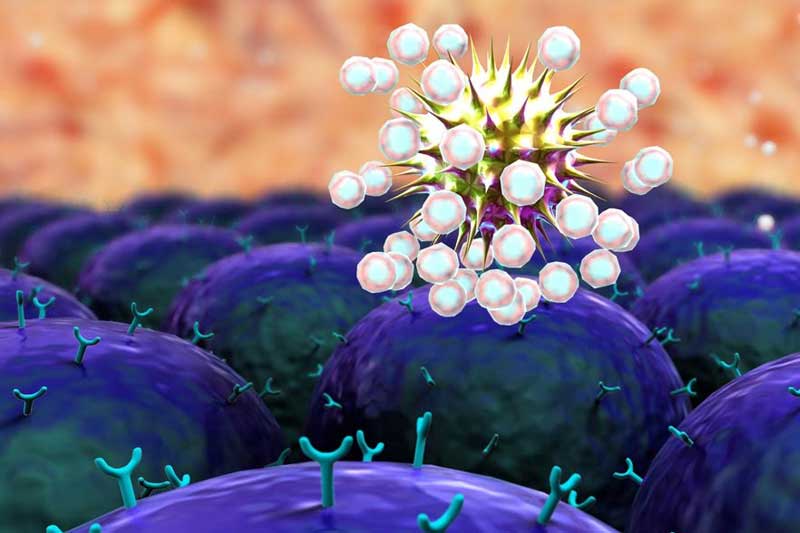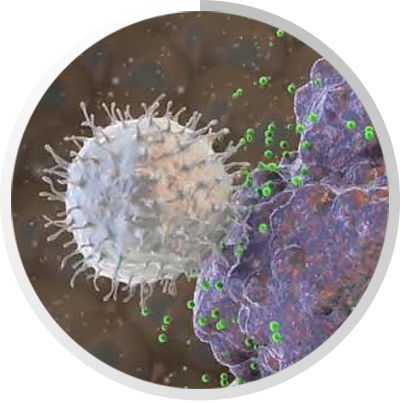Advanced Immunotherapy Options Are the Future of Cancer Treatment

Immunotherapy is the new hot-topic in cancer treatment discussions, but what exactly is it? Immunotherapy is a cancer treatment designed to boost the body's natural ability to fight cancer by restoring immune system function. A healthy immune system destroys an average of 10,000 cancerous and precancerous cells a day. When the immune system becomes compromised and can no longer handle the task of removing these dangerous cells, cancer develops. To make matters worse, cancer cells will often times develop ways to block the immune system from working which can include changing its cell surface or even sending out signals to confuse the immune system altogether. With the correct immunotherapy treatment, many of these cancer survival mechanisms can be overcome. Even when chemotherapy has failed to yield results, often times immunotherapy patients can continue to see success because immunotherapy operates independent of other treatments. It is important to know that not all immunotherapy treatments are the same. Just as chemotherapy needs to be tailored to a patient's needs, immunotherapy too must be personalized to activate the parts of the immune system that are being compromised. Advancements in the immunotherapy field are slowly becoming more popular for cancer patients and one immunotherapy in particular is making waves in the cancer community.
Disclaimer: Individual results will vary. Envita makes no guarantees for outcomes. Each patient case is unique. Please consult your doctor before making any changes to your medical treatment. Not every patient is a candidate for care or achieves these results. Treatments used in this case may not all be FDA approved for the treatment of this condition.
IMX, or Immune Modulation Therapy is an advanced form of immunotherapy that trains the patient's body to find and effectively kill cancer cells. IMX goes beyond traditional immunotherapy treatments, bringing a multi-step approach that utilizes oncolytic viruses, genetic dendritic peptides, expanded natural killer cells, and check point inhibitors that are customized based on each patient's cancer needs. To get more in-depth information on this treatment watch the video above. It is important to understand that treatments like chemotherapy and radiation actually weaken the immune system which makes immunotherapy even more important for patients struggling with cancer. With the advent of new smart drugs in the form of checkpoint inhibitors, immunotherapy is finally being incorporated into more treatments for patients, but it is not enough. Many immunotherapy treatments lack the multi-step approach that IMX utilizes which can make all the difference for late-stage and difficult to treat cancers.
Immunotherapy has started to pique the interest of many oncologists around the world and has also caught the attention of The Wall Street Journal. The journal recently featured a miraculous story called, “Cancer's Super Survivors: How the Promise of Immunotherapy is Transforming Oncology,” where cancer patients found hope in immunotherapy and the extension of survival rates that these treatments can bring. Specialized immunotherapy methods, can be used as either alternative or adjunctive treatments to standard cancer treatments like radiation and chemotherapy. Life extension, improved quality of life, and even cancer remission are all possible and have been seen clinically with the help of immunotherapy. Leading researchers and healthcare professionals, feel that immunotherapies are an important future of cancer treatment. Below is an intriguing oncology conversation on immunotherapy from a group of well-established professionals in the field.
While immunotherapies are breaking-ground in cancer research they are still not a one-size-fits-all approach to treatment. Each patient potentially needs a different combination of therapies that will work the best for their unique type of cancer. This matching of treatment to the patient is called the “medical genetic blueprint,” which figures out which treatment combinations work best for a patient's unique expression of disease. This philosophy is changing the face of cancer treatment and is allowing the use of genetics to determine proper treatments and incorporate directly into immunotherapy treatments.
It is important to remember there are many different forms and options when it comes to immunotherapies being developed. Combination-immunotherapies like IMX show great promise at increasing survival rate in patients. Envita support's the use of immunotherapy as a standalone treatment to cancer, but has seen even greater results when used in combination with other important targeted treatments such as Genetically Targeted Fractionated Chemotherapy. Cancer is an ever evolving disease, but with the right combination of treatment and care, its evolution can be slowed and stopped. If you have any questions about this article, immunotherapy treatment options, or you wish to learn more, please contact us. We have dedicated education teams available to help answer any questions you may have; we are here to help.
Disclaimer: Some of the treatments mentioned (like IMX) in the above article are not all available in the US and are not FDA approved for the treatment or diagnosis of cancer. Patients should consult with their doctors before undergoing treatment or altering medical care. Envita Mexico is under Mexican law and jurisdiction and in no way does Envita make guarantees or claims of any outcomes for this or any treatment. In cancer treatment, individual results will vary and outcomes should not be expected. The information above is for education purposes only. Not all patient are candidates for IMX or immunotherapies and should consult their doctors.




















